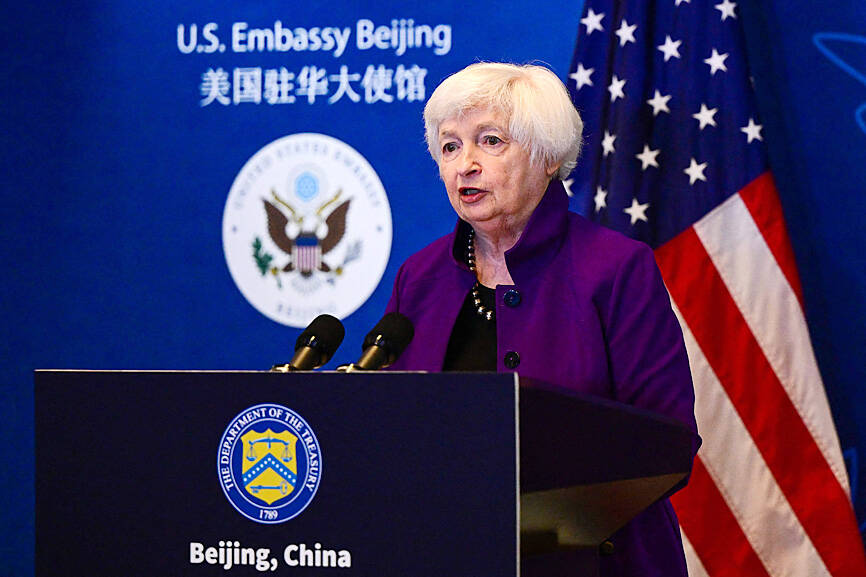US Treasury Secretary Janet Yellen yesterday said 10 hours of meetings with senior Chinese officials over the past few days were “direct” and “productive,” helping to stabilize the superpowers’ often rocky relationship as her four-day Beijing trip ended.
Before departing China, Yellen said Washington and Beijing remained at odds on a number of issues, but expressed confidence that her visit had advanced efforts to put the relationship on “surer footing.”
“The US and China have significant disagreements,” Yellen told a news conference at the US embassy in Beijing, citing Washington’s concerns about what she called “unfair economic practices” and recent punitive actions against US firms.

Photo: AFP
“But [US] President [Joe] Biden and I do not see the relationship between the US and China through the frame of great power conflict. We believe that the world is big enough for both of our countries to thrive,” she said.
With US-China relations at a low over national security issues, including Taiwan, US export bans on advanced technologies and China’s state-led industrial policies, Washington has been trying to repair ties between the world’s two biggest economies.
US Secretary of State Antony Blinken visited Beijing last month, the first trip by the top US diplomat during Biden’s presidency. US Special Presidential Envoy for Climate John Kerry is expected to visit this month.
Yellen said her visit aimed to establish and deepen ties with China’s new economic team, reduce the risk of misunderstanding and pave the way for cooperation in areas such as climate change and debt distress.
“I do think we’ve made some progress, and I think we can have a healthy economic relationship that benefits both of us and the world,” she said, adding that she expected increased and more regular communications at the staff level.
Briefing reporters after the visit, a senior US Department of the Treasury official said the trip as expected did not result in specific policy breakthroughs, but was “very successful” in terms of “re-establishing contact” and building relationships.
She said that Chinese officials raised concerns about an expected US executive order restricting outbound investment, but she assured them any such measure would be narrow in scope and enacted in a transparent way.
She reiterated that Washington was not seeking to decouple from China’s economy, as doing so would be “disastrous for both countries and destabilizing for the world.”

UNITED: The premier said Trump’s tariff comments provided a great opportunity for the private and public sectors to come together to maintain the nation’s chip advantage The government is considering ways to assist the nation’s semiconductor industry or hosting collaborative projects with the private sector after US President Donald Trump threatened to impose a 100 percent tariff on chips exported to the US, Premier Cho Jung-tai (卓榮泰) said yesterday. Trump on Monday told Republican members of the US Congress about plans to impose sweeping tariffs on semiconductors, steel, aluminum, copper and pharmaceuticals “in the very near future.” “It’s time for the United States to return to the system that made us richer and more powerful than ever before,” Trump said at the Republican Issues Conference in Miami, Florida. “They

GOLDEN OPPORTUNITY: Taiwan must capitalize on the shock waves DeepSeek has sent through US markets to show it is a tech partner of Washington, a researcher said China’s reported breakthrough in artificial intelligence (AI) would prompt the US to seek a stronger alliance with Taiwan and Japan to secure its technological superiority, a Taiwanese researcher said yesterday. The launch of low-cost AI model DeepSeek (深度求索) on Monday sent US tech stocks tumbling, with chipmaker Nvidia Corp losing 16 percent of its value and the NASDAQ falling 612.46 points, or 3.07 percent, to close at 19,341.84 points. On the same day, the Philadelphia Stock Exchange Semiconductor Sector index dropped 488.7 points, or 9.15 percent, to close at 4,853.24 points. The launch of the Chinese chatbot proves that a competitor can

TAIWAN DEFENSE: The initiative would involve integrating various systems in a fast-paced manner through the use of common software to obstruct a Chinese invasion The first tranche of the US Navy’s “Replicator” initiative aimed at obstructing a Chinese invasion of Taiwan would be ready by August, a US Naval Institute (USNI) News report on Tuesday said. The initiative is part of a larger defense strategy for Taiwan, and would involve launching thousands of uncrewed submarines, surface vessels and aerial vehicles around Taiwan to buy the nation and its partners time to assemble a response. The plan was first made public by the Washington Post in June last year, when it cited comments by US Indo-Pacific Commander Admiral Samuel Paparo on the sidelines of the Shangri-La Dialogue

MARITIME SECURITY: Of the 52 vessels, 15 were rated a ‘threat’ for various reasons, including the amount of time they spent loitering near subsea cables, the CGA said Taiwan has identified 52 “suspicious” Chinese-owned ships flying flags of convenience that require close monitoring if detected near the nation, the Coast Guard Administration (CGA) said yesterday, as the nation seeks to protect its subsea telecoms cables. The stricter regime comes after a Cameroon-flagged vessel was briefly detained by the CGA earlier this month on suspicion of damaging an international cable northeast of Taiwan. The vessel is owned by a Hong Kong-registered company with a Chinese address given for its only listed director, the CGA said previously. Taiwan fears China could sever its communication links as part of an attempt